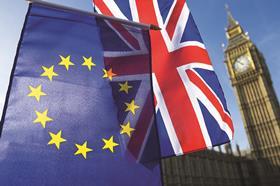FMB boss urges government to do more to reassure EU workers over their long-term future

Fears are mounting throughout the industry that EU workers heading home for Christmas will fail to return post-Christmas due to the uncertainty surrounding Brexit.
The concerns come as a new survey from the Federation of Master Builders (FMB) revealed 85% of its members felt EU workers were either “very important” or “important”, while just over three quarters (76%) said their businesses would either be “very negatively” or “negatively” impacted by their departure from the UK, either now or post-Brexit.
Earlier this month, a survey from the Home Builders Federation of 37,167 workers found EU workers on housebuilding sites represent almost a fifth of the workforce across the UK, with the number soaring to almost half in London. It also showed that 15% of bricklayers are from outside the UK, with that number again leaping to nearly half in the capital.
Official statistics suggest that 12.6% of general construction workers across the UK are foreign-born, of which 5.7% are from EU-accession countries. The census also suggests the reliance on housebuilding on foreign workers is heavier than the wider construction industry.
Brian Berry, chief executive of the FMB, which represents thousands of small and medium-sized firms throughout the UK, has urged the government to do as much as possible to reassure EU workers that they are vital to the country’s construction sector.
“We are worried about after Christmas if EU workers are going back to their home countries they may not think about coming back or may decide to stay because of the uncertainty around Brexit,” he said.
“We want the government to reassure EU workers as much as they can that they are welcome, that they are needed and that they have a place in the UK because British building depends on it.”
Berry added there was already anecdotal evidence that Polish workers in particular were returning home. “Economic conditions in Poland are much better. Here, you’ve got the fall in sterling so the financial advantage isn’t as great, as well as uncertainty about whether EU workers are actually welcome in this country.”
Lord Stunell, the Liberal Democrat peer behind a review of Brexit’s impact on the construction industry, said while he did not believe there would be a mass exodus of EU workers post-Christmas, it was likely to be a “moment for pause”.
“It’s not so much a question of them not coming back in the New Year as much as that will be the time where they are weighing up what it is really like in their home country. ‘What are the job opportunities here?’ ‘Do I want my family to be left in uncertainty?’
“That’s when plans might be set. It might very well be when they start to look around and say next time there’s an opportunity, they will decide to move back home.”
Ann Bentley, global practice director at Rider Levett Bucknell, said EU workers not returning to the UK after Christmas was a “real concern, particularly with eastern European workers, as that area is seeing very strong growth in construction work”.



























No comments yet